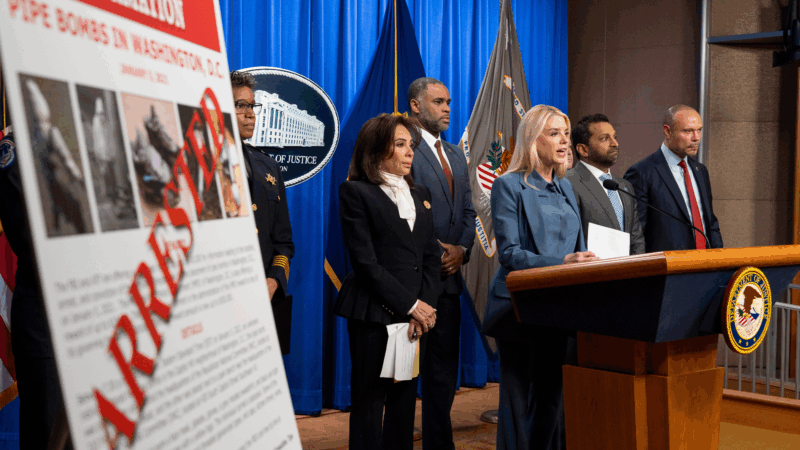Senate passes spending bill to avoid a government shutdown
The Senate has approved a short-term spending bill to keep the government open through the end of September. The measure was approved largely along party lines, but an earlier procedural vote exposed deep divisions among Democrats.
While Republicans control the Senate, they do not hold the 60 seats necessary to break a filibuster. Ultimately, 10 Democrats voted with Republicans to advance the bill to avoid a shutdown.
The bill includes a small increase in defense spending and about $13 billion in cuts to non-defense programs. The bill is in line with GOP promises to cut domestic spending. Democrats characterized the bill as a “blank check” to President Donald Trump because the bill makes no attempt to rein in the administration’s ongoing efforts to cut spending previously approved by Congress.
The vote highlights deep divisions within the Democratic party over how to respond to President Trump in his second term. The decision by Senate Minority Leader Chuck Schumer, D-N.Y., to support the funding bill sparked an intense backlash from House Democrats, who almost unanimously opposed it.
“I think there is a deep sense of outrage and betrayal and this is not just progressive Democrats — this is across the board, the entire party,” New York Rep. Alexandria Ocasio-Cortez told reporters Thursday night at a party retreat in Leesburg, Va.
“I think it is a huge slap in the face,” she said.
The Senate Democrats who opposed the bill — a stopgap measure known as a continuing resolution, or CR — argued that helping to pass it would give Trump and his advisor Elon Musk the leeway to continue slashing the federal government without oversight. But they also acknowledged that a shutdown would bring pain and disruption. New Mexico Sen. Martin Heinrich said Thursday that Democrats were wrestling with what the “least worst outcome” would be.
“This president has put us in a position where, in either direction lots of people’s constituents are gonna get hurt, and hurt badly,” said Heinrich, who voted against advancing the bill. “I think when you confront a bully, you have to confront a bully. And I’m not gonna vote for this CR. But I fully respect people who’ve come to a different conclusion because in either pathway — this is a president who is very comfortable with the pain that either direction will create.”
Schumer also said that Democrats were given a choice between two bad options, but he determined that keeping the government open would “minimize the harms to the American people.”
“As bad as passing the CR is, allowing Donald Trump to take even more power via a government shutdown is a far worse option,” Schumer said on the Senate floor Thursday.
Shutdown averted, but Democrats walk away divided
The backlash to Schumer’s decision has turned to rumblings of frustration about his future. House Democratic Leader Hakeem Jeffries, D-N.Y., was asked directly about whether Democrats need a new leader in the Senate. He evaded.
“Next question,” he said, moving on.
Multiple Democratic senators refused to answer whether they had confidence in Schumer as leader of the party.
When asked by reporters, freshman Sen. Ruben Gallego, D-Ariz., remained silent. He later told NPR that while the party was united “it would help us unify more if we had a [postmortem.]”
Sen. Chris Coons, D-Del., told reporters that there was a “clear division in strategy” between Jeffries and Schumer.
“I think leader Jeffries does reflect some of the concerns I’m hearing from colleagues, from the House who have also reached out to me,” he said.
Coons told reporters he believes House and Senate democrats can band together in opposition to Trump’s agenda moving forward, especially as the GOP works to pass their reconciliation bill.
“There’s plenty to unite us on the other side of today’s vote,” he added.
New Mexico Democratic Rep. Teresa Leger Fernandez told NPR Friday that Schumer was thinking “short-term.”
“What Democrats in the House took very seriously was that this wasn’t about a government shutdown. This was about giving Musk and Trump the ability to shut down the programs they didn’t like,” she said. “A shutdown is temporary. It forces them back to the table.”
Pipe bomb suspect told FBI he targeted U.S. political parties, memo says
The man accused of placing two pipe bombs in Washington on the eve of Jan. 6, 2021 told investigators someone needed to "speak up" for people who believed the 2020 election was stolen, prosecutors said Sunday.
Chinese military stages drills around Taiwan to warn ‘external forces’
The drills came after Beijing expressed anger at U.S. arms sales, and a statement by Japan's prime minister saying its military could get involved if China were to take action against Taiwan.
Trump and Netanyahu to meet in Florida at a crucial moment for the Gaza ceasefire
President Trump could use the face-to-face at his Mar-a-Lago estate to look for ways to speed up the peace process, as Israel's leader has been accused of not pushing his side to move fast enough.
‘Bomb cyclone’ forecasted to bring heavy snow, blizzard conditions and dangerous travel
A 'bomb cyclone' is intensifying severe winter weather for millions of people across the U.S. The system is expected to knock out power and disrupt holiday travel.
Russia sends 3 Iranian satellites into orbit, report says
The report said that a Russian rocket sent the satellites on Sunday from a launchpad in eastern Russia.
Viral global TikToks: A twist on soccer, Tanzania’s Charlie Chaplin, hope in Gaza
TikToks are everywhere (well, except countries like Australia and India, where they've been banned.) We talk to the creators of some of the year's most popular reels from the Global South.








